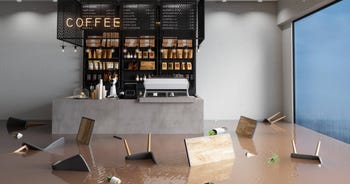How to make a claim on your business insurance: with small business examples
Making a business insurance claim can feel daunting when you’re already dealing with the aftermath of an unexpected disaster. We get it - you need to get back to trading quickly, and you don't necessarily have much headspace for the claims process.
Luckily, we can guide you through how to make an insurance claim in the UK, from the immediate steps after an incident through to receiving your payout.
We'll help you understand what evidence you need, realistic timelines, and how to avoid common pitfalls that might mean you get your claim rejected.
Let’s take it back to the start.

What is a business insurance claim?
A business insurance claim is a request for your insurance company to cover the cost of any losses that are covered in your policy.
Business insurance is made up of several different cover types, based upon the type of work you do and the risks your business faces. This means there are many different types of insurance cover you may need to claim against, or that may help protect you if someone makes a claim against you.
Public liability insurance claims
Public liability insurance can help cover the cost of claims made by a member of the public who has been injured or had something of theirs damaged while at your workplace.
It also can help cover you for injury or damage when you’re at fault when working at someone else’s premises. Possible reasons for claiming may include:
- You're painting a customer's house and you spill paint on their carpet
- A customer is burnt when you spill hot tea on them in your cafe
- Stock falls from a shelf in your shop and injures a customer
Employers' liability insurance claims
Employers’ liability insurance can help cover the cost of any claims made by an employee who is injured or has their belongings damaged while working for you.
This can either be on your premises or while they’re working somewhere else. You might need to claim in the following instances:
- An employee trips on a loose kitchen tile an injures themselves
- You’re an electrician with an apprentice that burns themselves because you’ve not taken out the necessary safety precautions
- A faulty ladder your business owns causes an employee to fall and injure themselves while working at a customer’s property
Legal expenses insurance claims
If legal action is brought against your business, legal expenses insurance can give you access to legal advice and help to cover legal costs if the case goes to court. It also can help cover these costs if you take legal action against someone else. Instances when you might claim on legal expenses insurance include:
- Cases of unfair dismissal or discrimination at work
- Personal injury claims
- Damage to business property
Professional indemnity insurance claims
If your business gives advice or offers any sort of professional services – such as accounting or chartered surveying - professional indemnity insurance can help to cover the cost of any compensation you need to pay to your clients.
Claims can be made for professional negligence or reputational loss, as in the following circumstances:
- If you provide marketing services and the incorrect contact information is printed on marketing materials like leaflets, and this leads to costly reprinting costs
- You’re an IT contractor that loses or leaks confidential information
- If you design a property and the measurements are incorrect, therefore there is remediation work needed due to the flawed design.
Commercial property insurance claims
If you own a non-residential property, commercial property insurance can help cover against the cost of damage to your property.
It can also help protect you from liability for any injuries or accidents that occur on your property, or for loss in revenue during times when you are unable to let your building out.
Typical commercial property insurance claims include:
- Your building is damaged by a gas explosion
- Flood damage to the building means you can’t rent it out until repairs are made
- Part of the building collapses and damages cars parked outside
Business interruption insurance claims
Business interruption insurance can help cover your business for loss of income or profit if your business has to close suddenly and can’t trade due to an unexpected event that’s listed on your policy.
You might need to make a business interruption insurance claim in the following circumstances:
- A water leak floods your premises, and you are unable to trade due to the damage caused.
- You suffer a break in, and the police require the property to be shut whilst investigations are carried out.
- A fire in your block means your building is damaged and must close until repairs are made
What are the major areas that can be covered by business insurance?
There are three main areas of business insurance, they are:
- General liability insurance - This type of insurance can help cover your business against injury to someone else, damage to another person’s property or issues like libel or slander. Read our guide to liability insurance.
- Commercial property insurance - This kind of insurance can help protect the building you use to run your business.
- Business income insurance - As a business, you can use this coverage to help pay for bigger expenses, like rent, utility bills or staff wages.
How do I make a business insurance claim?
Once you've handled the immediate aftermath, you can now start the claims process. Here's a step-by-step guide on what you need to do.
Gather your policy information
Before you ring your insurer, gather:
- Your policy number
- Your policy schedule showing what's covered
- Details of any previous claims
- Your VAT registration number if applicable
Having these to hand speeds up the initial call and shows you're organised.
Contact your insurer
Ring the claims number on your policy documents. Most insurers have a 24/7 claims lines for emergencies. When you call make sure to:
- Explain what happened clearly and factually
- Give the date, time, and location of the incident
- Describe the damage or injury
- Talk about any immediate actions you've taken
- Ask what happens next and what they need from you
The claims handler should log your claim and give you a claim reference number. Write this down – you'll likely need it for all future communications.
Under FCA Consumer Duty rules, insurers must make the claims process as easy as the buying process. So if you're finding it difficult to make your claim, tell your insurer – they should be able to provide appropriate support. At Bionic, we work only with a panel of trusted insurers.
Fill in all the paperwork
Your insurer should send you a claim form, either by post or email. This asks for detailed information about:
- The circumstances of the incident
- The extent of damage or injury
- Estimated costs
- Supporting evidence
- Whether the police were involved
Fill this in carefully. Under the Insurance Act 2015, you have a duty to make a fair presentation of the claim. This means:
- Providing accurate information
- Not withholding relevant facts
- Correcting any mistakes
- Responding honestly to all questions
Missing information or errors could end up delaying your claim. If you're struggling to estimate costs, ask your insurer for guidance.
Submit supporting evidence
Just like any investigation – you need to provide evidence with your claim form. The exact requirements depend on your insurer and claim type, but they could include:
- Photos and videos of damage
- Receipts for damaged or stolen items
- Repair quotes or invoices
- Crime reference numbers for theft
- Witness statements if available
- CCTV footage if you have it
Remember, do not dispose of any damaged items that you are claiming for. Insurers will often want to view damaged items, so make sure you take pictures of them to submit but do not dispose of them until the insurers agree you can do so.
Always speak to your own insurer to see what requirements they have and what you need to submit.
What evidence do I need to support my business insurance claim?
Making an insurance claim can be a hassle, so can having a claim made against you. But having all the relevant information to hand really helps, and you need to be aware of the process involved.
If you are claiming, contact your insurance provider, remember to have your policy number and other necessary information handy to ensure the claims process goes as smoothly as possible.
Make sure you can provide a clear account of the events that have led to your claim and provide as much detail as possible.
Here are some examples of what you might need to provide in certain circumstances.
A thief smashes your shop window, break-ins and steals expensive electronic stock
Assuming you have a shop insurance policy in place, your insurer may ask for:
- A crime reference number from the police
- Detailed list of stolen electronics with values
- Serial numbers for stolen equipment
- CCTV footage (if you have it)
- Details of the broken window or forced entry (was it double locked?)
- Any others security measures you had in place
- Witness statements if anyone around saw what happened
The neighbouring property to your salon has building work done and damages an adjacent wall
Assuming you have a salon insurance or tanning salon insurance policy. Your insurer may ask for:
- Multiple photos of all damage from different angles
- At least 2 quotes for repairs from qualified tradespeople
- Surveyor reports for structural damage
- Receipts for emergency repairs already made
- Building plans or specifications (for major damage)
An elderly customer slips on a greasy floor in your takeaway and makes a claim against you
Assuming you have the right takeaway insurance in place. Your insurer may ask for:
- Completed injury at work or accident report forms
- Witness statements from staff or other customers
- Your maintenance records showing you kept premises safe
- Any risk assessments you’ve filled in
- Any correspondence with the injured party (emails or messages)
A bad storm leads to a roof leak in your bakery, damaging your machinery, so you have to temporarily close
- Assuming you have adequate bakery insurance in place. You may be asked for:
- Financial statements proving your typical income
- An accountant's report on lost earnings
- Details of ongoing expenses during closure (rent, wages, energy bills)
- Evidence of the event that caused closure
- Records of alternative arrangements made (did you operate from elsewhere?)
- Contracts showing cancelled or delayed work
- Bank statements showing reduced income
How long will my business insurance claim take to process?
This really depends on your individual situation, so if you’re unsure, follow up with your insurer.
Claims can take a while, especially if they’re complex. According to the FCA the Financial Conduct Authority, claim processing times vary, here is the guidance:
- Simple claims – like minor property damage or straightforward liability claims with no dispute could take 2-6 weeks from submitting the claim to payout
- Moderate claims – like large property damage, disputed liability could take 2-4 months
- Complex claims – like major property damage or business interruption requiring someone to look into the financials. This could take 6-12 months or longer.
The Association of British Insurers reports that UK insurers paid out £8 billion in business insurance claims during 2024, with most straightforward claims settled within 8 weeks. Your actual timelines may vary.
When will my claim get paid out?
Once your claim is approved, most insurers pay within 5 working days, as required by FCA rules. The money typically goes straight into your business bank account.
Always confirm payment arrangements with your insurer, so you know what to expect and so you don’t run into any financial difficulty.
My claim is delayed, why is this happening?
Again, always contact your insurer to find out why your claim is delayed.
Some common reasons why claims can take a long time include:
- Missing or incomplete evidence - Failing to provide requested documents means your claim can't progress. Keep track of what your insurer has asked for and submit it quickly. For example, if your insurer has requested photos of your broken machinery, send it as soon as possible.
- Complex investigations - If liability is disputed (this is when someone involved denies wrongdoing) or there are concerns about the claim, insurers need time to investigate it properly. This makes sure there is time to get a fair result.
- Underinsurance - If you're underinsured, this can delay the process as your insurer needs to check if you are actually covered for the claim.
- Delays from others – If your claim involves other businesses like suppliers or partners or even insurers (like supply chain interruption), it could take longer to sort out.
- Errors in forms – If any forms weren't filled in properly, then they need to be filled in again, which can delay the process. Forms with errors or missing information get sent back for correction, adding weeks to the process.
What do I do if my business insurance claim is refused?
There are a few reasons why your claim might be refused, including:
- Your policy doesn’t cover you for the claim you’re making. Learn what business insurance doesn’t cover.
- You didn’t correctly follow the claims procedure
- The information you gave when taking out cover or claiming was incorrect
If your insurer does reject your claim, you should check your policy documents to make sure they were within their rights to do so.
If you think your insurer has unfairly rejected your claim, the first thing you need to do is complain to them directly in writing. Remember to keep copies of any letters or emails along with the dates and times of any phone calls you make.
If the issue isn’t resolved to your satisfaction within in eight weeks, you can take your case to the Financial Ombudsman Service.
Does it cost me to make a claim on my business insurance?
Making a claim isn't free. Every business insurance policy includes an excess – the amount you pay towards each claim before your insurer pays the rest.
Your excess might include:
- Voluntary excess - An amount you chose when buying the policy (higher voluntary excess = lower premiums)
- Compulsory excess - A mandatory amount set by your insurer
For example, if your total excess is £500 and your claim is for £3,000, you pay £500 and your insurer pays £2,500.
The excess is deducted from your settlement. You don't pay it separately – it's normally taken off the claim amount. You also need to make sure you can afford the excess in the event of a claim - there's a balance between lowering your premium and setting your excess too high.
Your premium may increase after a claim
Making a claim almost always increases your renewal premium. This means your insurance costs may be higher when you come to renew your policy.
Even if you weren't at fault, insurers can see you as a higher risk because you've claimed before.
The actual amount your premium increases is down to your own insurer. However, as general guidance on what to expect, The Association of British Insurers, suggests typical premium increases after claims are:
- Small claims (under £1,000) may see a 10-20% increase
- Medium claims (£1,000-£10,000) may see a 20-40% increase
- Large claims (over £10,000): may see a 40%+ increase
Your actual renewal costs may vary.
What are some of the most common business insurance claims in the UK?
Understanding what other businesses claim for helps you prepare for likely risks and understand whether your cover is adequate.
1. Property damage from weather events - Storm damage, flooding, and water leaks consistently top UK business claims. The Association of British Insurers reports that claims for weather damage to businesses in 2025 is up 28% on the same quarter last year.
2. Theft - Tools, equipment, stock, and cash theft affect many UK businesses yearly. Retail businesses and tradespeople face particularly high theft rates. In fact, in our shoplifting report, we found that the Metropolitan Police reported over £15M worth of stolen goods and money from businesses in 2023.
3. Public liability claims - Customer slip-and-fall accidents, injuries from falling stock, and food-related illness are common liability claims, whether you run a takeaway, pub or other type of food business.
4. Fire damage - Despite improved safety standards, fires still cause devastating damage to business premises. Electrical faults and equipment failures can be common causes.
5. Business interruption - When businesses must close due to covered events (fire, flood or forced closure by authorities), business interruption insurance can help with lost income or profit.
These types of claims often happen alongside claims for property damage, when an incident is so bad that a business has had to close its doors temporarily.
Business insurance up for renewal? Compare quotes with Bionic
Knowing you have the right insurance in place for your business, can give you peace of mind in the unfortunate even you ever need to claim, or a claim is made against you.
At Bionic, we help UK businesses find insurance that covers their unique needs.
We understand that every business faces different risks. A restaurant's insurance needs are completely different from a construction company's. By understanding your business, we help you get cover that helps protect against the risks you actually face.
Compare business insurance quotes from our panel of trusted insurers today. Bionic’s UK-based insurance team will be on-hand to guide you through the process.








